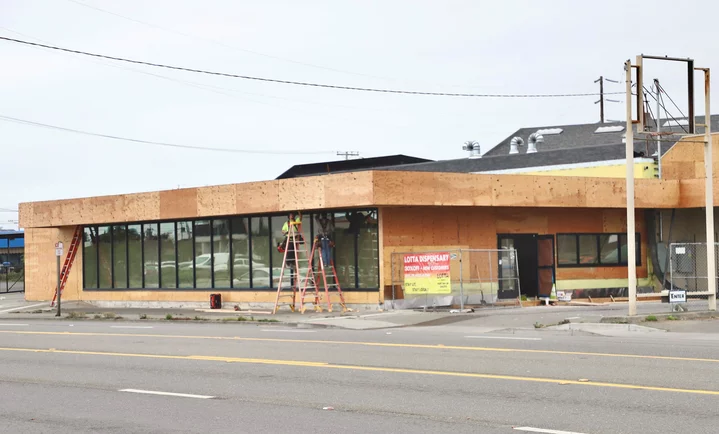A new cannabis dispensary going in on Broadway in Eureka. | Photo by Andrew Goff.
###
PREVIOUSLY
###
The California State Senate yesterday passed Assembly Bill 564, which now awaits only Gov. Gavin Newsom’s signature to repeal a recent increase in the state’s cannabis excise tax rate. Newsom previously indicated that if the bill makes it to his desk, he will sign it into law.
On July 1 the state’s cannabis excise tax rate jumped from 15 percent to 19 percent back as part of a political bargain struck in 2022 to help stabilize the fledgling legal weed marketplace. Industry advocates, including many here in Humboldt County, argued that the legal weed market remains economically precarious, with wholesale and retail sales seeing a steady trend of declining revenues. A tax increase now, these advocates warned, would only serve to hamstring the industry’s efforts to compete against a still-flourishing black market.
Critics of AB 564, meanwhile, countered that the tax cut could would eliminate $180 million annually in much-needed tax revenues for law enforcement, child care, services for at-risk youth and environmental cleanup.
This past fiscal year, our North Coast Senate district received more than $38 million in state Fish and Wildlife grants for a long list of environmental projects including watershed enhancement, cleanup remediation, research and more.
As initially proposed, AB 564 would have suspended the recent tax increase for the next six years. As amended in the Senate, however, the excise tax will drop back down to 15 percent at the end of this month and remain there through June 30, 2028. From that point forward, the California Department of Cannabis Control (DCC) will decide every other year whether or not to increase the rate with the eventual goal of recouping the revenue lost when California discontinued its cultivation tax in June 2022. Under the bill, the excise tax rate can never exceed 19 percent.
Ross Gordon, a policy analyst with the industry nonprofit Origins Council, told the Outpost this afternoon that while he doesn’t expect the passage of AB 564 to solve all of the industry’s woes, it’s a step in the right direction.
“I think we’ve seen the impact of the tax rate going to 19 percent over the past couple of months,” he said. “It’s really had an impact across the market, but especially on smaller farmers and smaller brands.”
Gordon said that after the tax hike took effect in June, local dispensary owners sought to offset the resulting price hikes by purchasing cheaper weed, often grown by larger companies outside the area.
“I just heard from a number of retailers that products from smaller producers were kind of being edged out on the shelves as a result of the tax increase,” he said.
Others industry organizations also celebrated the bill’s passage. Amy O’Gorman Jenkins, executive director of the California Cannabis Operators Association, issued a statement saying, in part, “By stopping this misguided tax hike, the Legislature recognized that smart policy grows revenue by keeping the legal market viable. Driving consumers away from regulated dispensaries would have only undermined public safety and reduced funding for the very programs we all want to protect.”
Others don’t see it that way. Jim Keddy, executive director of the Sacramento nonprofit Youth Forward, previously pointed out that while revenues have declined, the legal industry has grown every year since sales began in 2018. Production has increased by 70 percent since 2020 and sales of cannabis products increased by more than 5 percent last year.
Keddy and others don’t buy the premise that lowering the excise tax will actually increase state revenues by allowing the industry to thrive.
“As the Governor considers whether to sign or veto this legislation, I hope he fully considers how it could reduce access to child care and cause cuts to youth programs at a time in which families are really struggling,” Keddy said in an emailed statement.
Tom Wheeler, executive director of the Environmental Protection Information Center (EPIC), feels similarly.
“EPIC is disappointed in the passage of AB 564,” he told the Outpost. “Although there were some improvements to the bill, it still strips critical funding for environmental restoration and remediation activities directly related to historic and ongoing illicit cannabis production.”
The bill, authored by San Francisco Democratic Assemblymember Matt Haney, passed in the Senate by a landslide vote of 39-1, with Van Nuys Senator Caroline Menjivar casting the lone dissenting vote. Our North Coast representative, Senate President Pro Tempore Mike McGuire, was among the “yes” votes, as was Chris Rogers, our region’s representatives in the Assembly, when that house passed the bill on June 4 by a vote of 74-5.
The Outpost reached out to McGuire’s office for comment today but had not heard back by publication time.

CLICK TO MANAGE